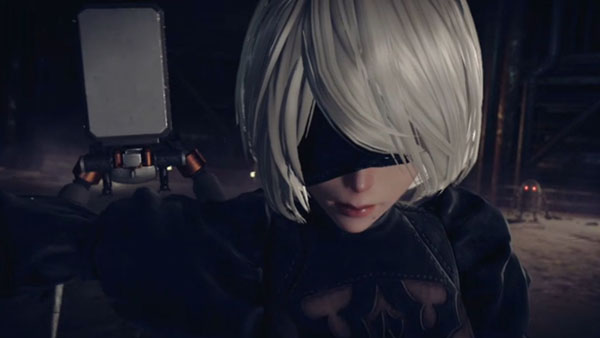Review: ‘Nier: Automata’

Gabe Young ’20 / Emertainment Monthly Staff Writer
Long ago, back in 2010, a little game was released called Nier. Nier didn’t exactly do too well with critics, but there was something special about it that made it unique. It found a place in the hearts of gamers and slowly started to build a cult following. Unfortunately for said fans, they would have to wait for seven years to see anything new out of their beloved game.
The original Nier had its problems to be sure, and yet people still loved it. But the writing of the one, the only Yoko Taro, famous (or infamous) for being one of the most eccentric game designers in the world. He’s produced such controversial work as the entirety of the Drakengard series and has a distinctive feel to his writing in which he reacts to issues and tropes he sees over and over again in generic video game storylines. Oftentimes, his characters are odd, complex, completely insane, or severely emotionally disturbed, and most importantly, no one ever, ever gets a happy ending.

Seven years later, Taro and Platinum Games have given us Nier: Automata, a unique, entertaining experience that is absolutely a worthwhile purchase. The game is not perfect, but that goes without saying. Automata is not like most games released this year. It has smooth combat mechanics typical of Platinum but nothing that really stands out. It’s perfectly enjoyable but very similar to previous Platinum games. Players strike with a mix of heavy and light attacks, they dodge and weave in between enemy fire and strike back with a precisely timed counter. The plot and mechanics of Automata go hand in hand in a way that is surprisingly logical.
Many years ago aliens invaded the earth, causing humans to flee to the moon and develop a new kind of soldier. The organization known as YorHa was created to fight the alien threat and is entirely made up of android soldiers. From the commander to the lowliest grunt, all of YorHa is artificial. The player takes the role of 2B, a combat android created for the specific purpose of fighting for the freedom of Earth. 2B is sent down to the surface, accompanied by a scouter android named 9S in order to destroy the alien threat once and for all. The story touches upon themes and ideas that have been heavily discussed in video games as well as fiction at large, but covers them in new, intriguing ways.

The majority of what makes Automata unique is its exploration in gameplay of what it’s like to be an android. Rather than have a generic upgrade tree, 2B has an OS Chip. The player finds upgrade chips throughout their adventures and can fit them into the OS Chip as long as there is space, which often times there isn’t. The player has to balance the benefits and tradeoffs of having a large but powerful ability with having several smaller, less effective chips. It’s a fascinating system that really tasks the player with discovering their own play style and managing the skills that are needed in a limited space environment.
There is plenty of depth in the combat system itself as well as the way basically everything in the game functions. The HUD can be disabled in order to free up space for the OS chip. The game can’t be saved unless 2B is in an area where she can connect to the orbiting YorHa base and make a backup of her consciousness. Even death is treated as just another part of being an android. Dying means 2B drops a corpse that holds all of her upgraded OS chips. When the player respawns in an exact copy of their old body, they can attempt to get the OS chips back, which means going into the deadly area that killed them in the first place of simply carrying on without the bonuses that the chips grant. Nothing is generic in Automata. It never settles on being something predictable.

The music is fantastic, almost supplanting the previous game’s excellent soundtrack. The voice acting is up to par and the combat is solid beyond belief. Unfortunately, the combat can get stale depending on how the game is played. On normal difficulty, the enemy encounters tend to get repetitive, mindless, and easy, however even one difficulty level above the standard sends the player into a world of hurt where bosses one shot 2B. In the end, it’s either repetitive encounters or insane difficulty. The physical world map, while somewhat vast, is generically bland and boring after seeing the same muted tones over and over again.
All this adds up to is an experience that is placed in an open world but feels like it should’ve been restricted to a more linear experience. There is a lot to love in Automata, but trying to explore it to its fullest runs the risk of burning out long before the story picks up. The range of content is impressive, but it doesn’t all feel necessary. As it stands, Nier: Automata is a long game, asking the player to accomplish much in order to fully complete and understand the story. The combat is solid, especially in the boss fights, and the story offers a unique twist on well worn concepts. If you’re a fan of the series or just a fan of the weird, wild, philosophical, or tragic, you should do yourself the favor and play Nier: Automata.